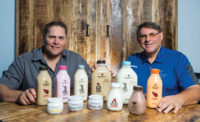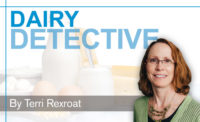Aurora Organic Dairy is a leading organic dairy company that serves the private-label market. With headquarters in Boulder, Colo., the company began marketing organic milk in 2004 and has been on a growth track ever since, as the demand for high-quality organic milk continues to grow.
Aurora Organic Dairy is a leading organic dairy company that serves the private-label market. With headquarters in Boulder, Colo., the company began marketing organic milk in 2004 and has been on a growth track ever since, as the demand for high-quality organic milk continues to grow.
As a vertically integrated organic dairy company, Aurora Organic Dairy (AOD) learned early in its development that sustainability initiatives are not only good for the planet, they can also contribute to improved operating efficiencies. With organic dairy farms in Colorado and Texas, and a fluid milk plant in Colorado, AOD built many of its facilities from the ground up and incorporated sustainability initiatives along the way.
AOD completed a three-year product life-cycle analysis with the University of Michigan in 2011, which provides a benchmark for the company’s carbon footprint, energy use, water footprint, solid waste and nutrient densities. Information about the products’ environmental impact - from seed to shelf - has allowed us to identify opportunities and reduce the carbon footprint of a gallon of organic milk by 13% and energy use by 7% since 2008.
Armed with this valuable data, we can better determine our sustainability priorities and report the progress in our first corporate sustainability report. This report will reflect AOD’s holistic approach to sustainable business by considering its impact on key stakeholders as well as the environment. In this process, management found that establishing its product life-cycle data and knowing where AOD stands with environmental performance is actionable and can be an important stand-alone sustainability initiative. Tracking this information allows companies like AOD to better make common sense and capital investment decisions where they will have the most impact.
From energy-efficient systems in our processing plant to emission-reducing initiatives at our dairy farms, we have focused on enhancing operations to reduce our impact on the environment. One practical example at AOD’s farms is mitigation of methane gas emissions from animal waste. AOD composts or ages its manure at all dairy farms, cutting down on these emissions and providing the dairies with organically approved fertilizer for its pastures. Additionally, some of its facilities use a dry vacuum system to collect manure, which uses less water in the barns than other systems.
Another result of AOD’s research was a shift from the disposable udder wipes used in milking parlors to washable microfiber towels. AOD learned it could save thousands of pounds of solid waste this way with a modest capital investment. After careful testing, the reusable wipes showed no loss in milk quality while potentially eliminating more than 9,000 pounds of paper towel waste per year once implemented at all farms. The project can also reduce CO2 emissions by more than 300 metric tons and cuts down on water use by the equivalent of 10 Olympic-sized swimming pools each year.
With ample sunshine at all its locations, AOD also identified creative ways to use renewable solar energy. A solar thermal hot water heating system is being used at one facility to heat 900 gallons of water used for its dairy parlor wash-ups every day. This installation can reduce the propane and natural gas used in other water-heating systems.
At AOD’s fluid milk plant, energy savings were built into the state-of-the-art facility when it was constructed in 2004. An energy-efficient design included variable speed motors, advanced refrigeration systems, low-wattage lighting and construction materials to prevent energy loss. Continued demand for organic dairy products prompted a major plant expansion in 2011, allowing the processing facility to reduce its carbon footprint per gallon of organic milk as the facility leverages its energy efficient systems.
Furthermore, in 2011, AOD’s processing plant became one of the first to participate in an off-site solar panel leasing program with its electricity provider. This allows the processing plant to source renewable solar energy while saving the significant capital investment of installing its own solar panels. Other operational initiatives, such as increasing feed and product transportation efficiencies and recycling processing plant materials, have helped reduce our company’s impact on landfills and the environment.
Aurora Organic Dairy’s position as an integrated dairy business provides its people with a unique perspective on the role both producers and processors play in environmental stewardship. Being a sustainable business is a long-term commitment requiring operational creativity and ownership of results across the entire organization. This intuitive approach can result in a more efficient supply chain and lower environmental impact, from cow to carton. n
Sonja Tuitele is the director of communications and sustainability for Aurora Organic Dairy, Boulder, Colo.
Dairy Foods seeks essay from dairy processors. Contact carperj@dairyfoods.com.
Get our new eMagazine delivered to your inbox every month.
Stay in the know on the latest dairy industry trends.
SUBSCRIBE TODAYCopyright ©2024. All Rights Reserved BNP Media.
Design, CMS, Hosting & Web Development :: ePublishing


